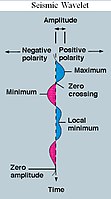
Photo from wikipedia
Power quality disturbances (PQD) degrades the quality of power. Detection of these PQDs in real time using smart systems connected to the power grid is a challenge due to the… Click to show full abstract
Power quality disturbances (PQD) degrades the quality of power. Detection of these PQDs in real time using smart systems connected to the power grid is a challenge due to the integration of energy generation units and electronic devices. Deep learning methods have shown advantages for PQD classification accurately. PQD events are non-stationary and occur at discrete events. Pre-processing of power signal using dual tree complex wavelet transform in localizing the disturbances according to time-frequency-phase information improves classification accuracy.Phase space reconstruction of complex wavelet sub bands to 2D data and use of fully connected feed forward neural network improves classification accuracy. In this work, a combination of DTCWT-PSR and FC-FFNN is used to classify different complex PSDs accurately.The proposed algorithm is evaluated for its performance considering different network configurations and the most optimum structure is developed. The classification accuracy is demonstrated to be 99.71% for complex PQDs and is suitable for real time activity with reduced complexity.
Journal Title: Bulletin of Electrical Engineering and Informatics
Year Published: 2021
Link to full text (if available)
Share on Social Media: Sign Up to like & get
recommendations!